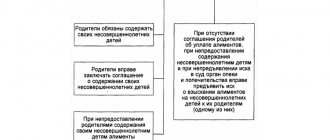Funds for the benefit of the children will begin to be automatically transferred by accounting employees, and the father will be able to obtain a certificate from his workplace at any time to prove the fact of payment of alimony. However, this option is not possible if the payer has unofficial income or the accountants refuse to deduct money for one reason or another.
- If the ex-wife or other person in whose care the children remain does not accept financial assistance from the parent, he should open a bank account in the name of each child. When a minor turns 18 (in some cases - 16), he will have the right to withdraw these funds and dispose of them at his own discretion.
Opening a bank deposit will help the father avoid the costs of legal proceedings and prevent unauthorized persons from encroaching on funds.
How can a man file for alimony himself?
The employer paying wages, the organization paying pensions, benefits, scholarships and making other payments are obliged, on the basis of a written application of the alimony payer, to withhold monthly from his wages, pensions, benefits, scholarships and other payments amounts of money in the established amounts, taking into account the restrictions provided for legislative acts of the Republic of Belarus, and pay (transfer to an account, transfer by mail at the expense of the payer) no later than three days from the date of payment of wages, pensions, benefits, scholarships and other payments to the person specified in the application. My personal opinion is that if he chooses a voluntary alimony order and pays her alimony in the amount of 25% of earnings for one child, then there will be no violations of the law on his part.
Making voluntary payments as alimony Before applying for alimony, the father needs to prepare the following documents:
- details of the second party for payment;
- identification;
- birth certificates of joint children;
- document on marriage or divorce;
- a certificate confirming the spouse’s incapacity (if so).
A man can account for the amount of money spent on children in different ways.
- The parent applies to the accounting department of the organization in which he works with a request to transfer a specific amount of money or a percentage of the salary to the account of the child support recipient. He, in turn, must take care in advance about opening a bank account or purchasing a card and provide the payer with the details.
How to collect them from the mother/wife?
The father will have to arrange child support in one of two ways:
- Concluding a voluntary agreement with your ex-wife. If she agrees to pay alimony in the required amount and order, then the two of them can contact a notary to draw up and notarize the agreement. This agreement has the same legal force as a writ of execution. And this will help avoid evasion of payments on the part of the mother.
- If an agreement cannot be reached, then the father needs to go to court. If you win in court, the corresponding decision to collect alimony is sent to the bailiff service. They will be responsible for collecting child support from the mother. However, the mother, in turn, has the opportunity to appeal the court's decision.
The claim can be considered by two courts:
- World Court. He considers simple cases involving the collection of alimony. If other family aspects do not appear in the case, then you need to apply here.
- District Court . If there are other questions, for example, about the place of residence of the children, then the case goes to the district court. You should also contact us here if, in addition to collecting alimony, there is a need to establish paternity.
On a note. The plaintiff can go to court both at the place of his own residence and at the place of residence of the defendant.
When filing a claim, you will need to collect the following documents:
- Copies of passports of the plaintiff and defendant.
- Copies of children's birth certificates and marriage/divorce certificates.
- Certificate of family composition. It can be obtained from the housing maintenance company at the place of registration. If the mother lives separately, the certificate must also be obtained at her place of residence, and you may have to draw up a corresponding application for this. If there is no information about the defendant's address, a petition must be filed to establish the place of his current residence.
- Calculation of the amount of alimony with justification. The amount of child support must be supported by evidence of expenses for the child - checks, receipts, receipts, etc.
In addition to the documents, it is necessary to prepare the statement of claim itself. In accordance with the requirements specified in Article 131 of the Code of Civil Procedure of the Russian Federation, the application must indicate the following:
- Name of the court.
- Full name of each party and their address details.
- The very requirement to collect alimony and the rationale for its legality.
- Evidence in the case.
- Required amount of alimony.
- List of attached documents.
We previously talked about how such a statement of claim is drawn up if the mother demands alimony from the father to support herself and the child.
In the future, child support can be deducted directly from the mother’s salary - her employer will automatically transfer it to the recipient’s account. If there is no or insufficient income, alimony can be collected directly from the mother’s bank account, as well as her property.
Can a father file child support for himself?
In legal practice, a common situation is when, after a divorce, the ex-wife demands that the father of the child pay funds for his maintenance. But it also happens that a man conscientiously approaches the issue of raising and providing for children.
Let's consider how a father can apply for child support for himself: what is required for this and which authority to contact. Please note that the former spouse cannot sue himself in order to collect alimony, since this procedure is compulsory. But is it possible to voluntarily arrange child support for minor children? The transfer of funds for dependent children at one's own request is equivalent to the independent assignment of child support obligations.
What does the amount depend on?
The calculation of the amount of alimony for a parent is not as fixed as alimony for children. The court, when deciding the issue of awarding alimony and establishing its amount, is guided by clause 3 of Article 87 of the RF IC and proceeds from the financial situation of both the parent and the offspring or offspring.
Monthly payments in favor of the parent are determined as a fixed amount proportional to the minimum wage.
This amount is divided among all children, even if a parent filed a claim against one of his offspring, not wanting to collect alimony from the others, the court will divide the awarded amount by the number of children, and the defendant will pay only his share.
The amount of child support awarded will be small because the award is intended to provide for minimum needs.
The calculation of the amount of participation in additional expenses is carried out according to a different principle and can, if the income of the offspring allows it, many times exceed the amount of alimony. It all depends on the reasons for the purpose of this payment.
Is it possible to apply for alimony on yourself?
Old Wallet 10/07/2009, 1:38 pm Listen, I myself recently changed the amount of alimony and I know how difficult it is to do it officially. This is some kind of fantasy - the husband did not see a single summons to court, and did not know that alimony was awarded to him in court.
But the only summons to the court for deprivation of rights came: 001: I wonder how this one got to him? Maybe he just shrugged off the previous subpoenas and thought it was nonsense? But it was enough to come to court and present an account statement. Let him now file a counterclaim.net - they just didn’t send it (just like the traffic police don’t send anything) - no one needs it, and the last one is already from the bailiff service - they send it right away, but it’s too late...
Method 2: opening a special bank account
If desired, a man can open a bank account in the child's name or in his own name, giving the child the right to dispose of all the funds available there after he reaches a certain age (usually 18 years old).
It is especially recommended to follow this method of voluntary calculation of alimony when the ex-wife refuses to enter into a notarial settlement agreement with the father. If a man simply comes to terms with this fact, then later, in the event of a possible trial, the judge will have the right to blame the man for his own inaction. But if a citizen provides the authorized person with an extract from the account formed for the child over a certain period of time, then all questions and charges against him will be removed.
This is important to know: How to apply for divorce through State Services with minor children
When opening a special bank account, you will need to meet the main condition, namely, to determine the scheme and amount of accrued funds as a court would do under similar circumstances.
Can a father apply for child support against himself?
In addition, the payer will be confident in his ability to provide financial assistance to the children if the ex-wife demands this through the court after some time. When alimony is not prescribed by a court decision, the parent has the right to transfer funds to the children personally or transfer them to an already opened bank account, knowing its details.
If such information is not available to the payer, he can make transfers by mail.
- Can a husband be the initiator of signing an agreement to pay alimony? Yes, if the ex-wife is not going to solve this problem in court, and a conscientious father understands the essence of his obligations to their common children.
To draw up an agreement between parents, the presence of a notary is required. This specialist will help the parties draw up the document correctly and certify it with his signature.
Exemption from alimony
If there are the following grounds, adult children may be exempt from paying alimony:
- They are completely exempt from the obligation to provide financial assistance to their parents if the latter were legally deprived of parental rights. If such rights are subsequently restored by a court decision, no exemption from payment occurs (Article 71 of the Family Code of the Russian Federation).
- The court, taking into account the specific circumstances of the case, may exempt from alimony if the parents evade parental responsibilities in relation to the child against whom the claim is now brought. The defendant must prove the fact that the parent evaded his upbringing or maintenance. As a rule, witness testimony is taken into account. If alimony was collected from the mother or father, the payment of which they evaded, then the proof will be a certificate from the bailiffs about the existing arrears of alimony.
- If a parent committed a deliberate crime against his child or abused alcohol, drugs, or abused the child in childhood, the court has the right to relieve him of the obligation to provide financial assistance to the parents. Judicial practice is based on specific crimes or actions committed by the plaintiff.
Can a man apply for alimony on himself?
Important
HomeTypes of alimonyChild supportCan a father apply for alimony against himself Table of contents:
- What's the best way to proceed?
- How to make voluntary transfers to pay alimony
- Statement of claim to establish paternity
It is common for a woman, who does not receive help from the father of her child, to file for child support after a breakup in a family relationship. However, there are also men who take a responsible approach to the upbringing and maintenance of their children, who have an idea as to whether the father can file for alimony against himself.
And if this is possible, then what to do and where to go better. What is the best way to proceed? It is immediately necessary to clarify that the latter does not have the opportunity to file an application to collect alimony from the father, since the consideration of the issue is judicial and compulsory in nature.
In no case should the agreement violate the rights of children, therefore the amount of funds for their maintenance should be indicated no less than what would be established by the court. A state duty is necessarily imposed on an alimony agreement.
- It is necessary to carry out the procedure for acknowledging paternity. As a rule, it is initiated by mothers, but fathers are not limited in this right. The parent must contact the registry office where the child’s birth certificate was issued and declare their desire to enter their full name in the “father” column. But it also happens that the ex-wife deliberately retains the status of a single mother. In order for paternity to be established, the woman must give her consent to this outcome of the case.
How to arrange voluntary payment of alimony?
If the father voluntarily fulfills this obligation, the following options are possible:
- He contacts the accounting department and provides an account to which the employing organization will pay monthly alimony. Based on the transfers, the accounting department issues a corresponding certificate, which serves as confirmation that the father has fulfilled his alimony obligations.
- If the mother does not agree to receive financial support from her ex-husband, he can open bank accounts in the name of his children. And those will be able to use these funds upon reaching adulthood.
- The ex-husband can initiate the conclusion of an alimony agreement when the spouse does not file a lawsuit against him to collect alimony. Such an initiative is regarded as a voluntary fulfillment of one’s obligations to support children.
Of course, if the father voluntarily fulfills his obligations without a court order, no documents are required. The exception is cases of concluding an alimony agreement. So, when concluding this agreement or when submitting it to the justice authority, you must have the following documents with you:
- the man's identity document;
- a document certifying the fact of marriage or termination of marriage;
- certificates from the registry office certifying the fact of the birth of common children of the spouses;
- a document confirming the fact that the spouse is unfit to work.
It is worth noting that if the mother has sufficient earnings and refuses to receive financial support for the children, the justice authority may refuse to establish alimony. For this reason, it is necessary to submit a document to the court certifying the mother’s insufficient level of earnings.
Fathers try to voluntarily fulfill their obligations to support their children for the following reasons:
- due to liability for evading alimony;
- due to the risk of being deprived of parental rights.
When a father is deprived of parental rights, the legal connection between him and his children is severed. That is, by law they are recognized as strangers to each other.
But this is not a basis for refusing the father to fulfill his obligation to provide for the children. After all, at any time, a father deprived of his rights will be able to go to court to have them restored.
Thus, ex-husbands have the right to independently go to court to establish the amount and procedure for paying alimony, which they themselves will pay. This need arises due to various circumstances, but mainly due to mothers’ refusal to accept help from their former spouses or their demands for too much maintenance.
Can a man apply for alimony himself?
I would like to receive a court decision with a specific defined amount of alimony in Belarusian rubles (% of earnings), according to the law, which a teacher can actually pay. “Last edit: 13:11:2011, 22:11 by Labrik” https://day-off.by - portal about recreation and entertainment Lennie 14:11:2011, 11:01 » A man cannot collect alimony from himself , only his ex-wife can do this. It’s just that the ex-wife knows that if she applies for alimony, the alimony will be small, since the salary is not large.
One could try to conclude an agreement on the payment of alimony, but this is only possible if the ex agrees. My relatives have the same situation, only their ex demands alimony only in foreign currency. Am I thinking correctly? I ask people who think that I don’t like them to respond. If possible, I will come and share. Labrik 14:11:2011, 11:15 » Thank you very much for your answer! And if he pays alimony voluntarily, he can pay it without the participation of the accounting department of the enterprise where he works, simply transfer it to her card or by mail, saving the receipts? “Last edit: 14:11:2011, 11:17 from Labrik” https://day-off.by - portal about recreation and entertainment Lennie 14:11:2011, 13:00” Quote: TanyaMaksya from 14:11: 2011, 14:08 but you did not give the person advice on what to do. I quote the last line in my message: “My personal opinion is that if he chooses a voluntary alimony order and pays her alimony in the amount of 25% of earnings for one child, then there will be no violations of the law on his part.
Both parents bear the responsibility for maintaining and providing for their children in equal shares. After a divorce, the child remains with one of the former spouses, most often with the mother, and the father takes part in the life of his son or daughter, paying alimony and visiting them on time. Many parents try to resolve the child support issue peacefully.
Procedure for assigning alimony
According to the norms of Russian legislation, the issue of assigning alimony is resolved in 2 ways.
By entering into an agreement
In the agreement, the parties must indicate the amount of monthly payments and the order of transfer. You can use the sample contract that the notary has, or draw up your own and have it certified with the notary’s seal. This method is used in cases where there are no disputes or conflicts between people, and the terms of the agreement suit both. The procedure for formalizing the agreement lasts 1 day if the necessary documents have been provided.
By contacting government agencies with a statement
Applicable if the obligated party is against entering into a transaction. Disputes regarding the assignment of payments are resolved by order or in a general claim. In writ proceedings, civil cases are considered in undisputed cases, the resolution of which does not require the participation of the parties, specialists and witnesses. The order is issued within 5 days after acceptance of the appeal. In general claims proceedings, cases that require careful study are considered:
- the defendant does not agree with the requirements;
- the participation of third parties is required; the claimant wants to receive fixed amounts.
In this case, the process will last 2 months, the parties must be present at all court proceedings.
The father, before turning to the judicial authorities, must invite the child to enter into an agreement by filing a pre-trial claim. If the pre-trial procedure for resolving the dispute has not been followed, the payer has the right to file a motion to leave the application without consideration. If the applicant offered the defendant to voluntarily make payments, but the mother refused or ignored, then the case will be considered.
When making a decision, the judge must take into account:
- Financial situation of the parties. The position of citizens influences how many percentages are assigned.
- Number of able-bodied children.
- Grounds for appeal.
The application must be completed in accordance with the rules of Article 131 of the Code of Civil Procedure of the Russian Federation, and when submitting, the jurisdiction and judicial system of the Russian Federation must be taken into account. Claims are filed with the authorities at the payer’s place of residence in the magistrate’s court. When a positive act is issued, the debtor must begin to transfer money. For refusal to comply with a procedural decision, administrative and criminal penalties are provided.
In turn, the party can appeal the court decision to the appellate board. In a complaint, you can demand to completely cancel the procedural act or change it in a certain part. A decision is made about this.
When can a court reject a claim?
As a rule, the obligations established by law to support parents are fulfilled voluntarily and no difficulties arise.
But if help is needed and the parent cannot support himself, then the only option is legal action.
Only it is provided by law. After all, no other body has the authority to oblige individuals to perform certain actions. Accordingly, the father needs to prepare a statement of claim and submit it to the court. These are alimony claims. However, a simplified procedure, as when collecting funds from parents, is not allowed here. After all, it is necessary to prove some difficult points.
Difficult points need to be reflected in more detail, this will make it clear the grounds for refusing the claim:
- you should justify your need for support from the child . The law directly refers to the elderly age of the parent or the inability for health reasons to support themselves. These arguments need to be substantiated. This means that the father must provide documents to the court hearing. For example, this could be a health certificate. Documents are often provided confirming the difficult financial situation and so on;
. That is, it must be reflected that the defendant is the son or daughter of the plaintiff. Since this circumstance is basic, it must be proven documented. Otherwise, the judge simply will not have grounds to consider the claims on their merits. After all, the very existence of an obligation is based on family relations, so they should be proven first of all;
it is necessary to indicate a family relationship with the defendant- it is necessary to prove that the child has the opportunity to support his father . He must have a job or alternative income.
Based on this, the court will make one or another decision on the requirements. All evidence provided will be verified and evaluated. Therefore, you should not count on unambiguous, indisputable satisfaction of requirements.
In cases where the father has filed for child support, refusal to satisfy the requirements is known in judicial practice and is not uncommon. When a child has a large number of obligations to support his children, the father may be denied. After all, a son or daughter may simply not have an objective financial opportunity to transfer funds to their father.
The defendant's ability to work is key. If he is unable to work and earn income, then the claim cannot be satisfied.
However, the inability to work must be proven and documented. This should be an objective fact. For example, the presence of physical disabilities.
Refusals are often associated with the father having his own income. For example, he has a disability and cannot work due to this. At the same time, he receives an old-age pension and additional disability benefits. In total, his earnings will be quite a decent amount. Then the court may decide to refuse to satisfy the requirements.
In this case, the courts are based on the cost of living. This is the value of the funds that are needed to meet basic needs. The amount is set at the national level. And each region takes its own values, which cannot be lower than the minimum established by the Government of the Russian Federation. Accordingly, the court compares the father’s total income with the cost of living in the relevant region. If the income is higher than the specified value, then the claim will be denied.
Is it possible for a man to arrange alimony for himself?
You can often encounter a situation where a former spouse evades alimony payments, and the wife is forced to file a lawsuit in order to bring the negligent father to justice. However, many fathers themselves want to help their child and participate in their upbringing, so they can independently apply for alimony and make monthly payments.
The relationship between former spouses and their children is regulated by the Family Code of the Russian Federation. The RF IC stipulates the conditions under which one of the parents can issue alimony payments, and the further actions of the mother if the father evades his direct responsibilities.
The procedure for collecting and paying alimony in the future
Child support payments must continue until the child turns 18 years old. However, in 2020, a draft law on changes to the family code was submitted to the State Duma for consideration. According to it, the terms of payments are proposed to be extended to 24 years, provided that the child is undergoing full-time education at any educational institution. The law proposes to cancel maintenance only for the period of academic leave, but after its end, payments should resume.
This document is currently under consideration and has not entered into force. No other changes in alimony legislation are expected yet.
A citizen cannot sue for alimony for himself. If he intends to officially fulfill his alimony obligations, he must either enter into a notarized agreement on payments with the child’s mother, or act through the guardianship authorities. The latter have the right to initiate legal proceedings against any of the child’s parents, provided that there is no evidence that they have been provided with maintenance.
In what cases is it advisable to do this?
Why should a husband apply for alimony if he is required to pay it by law? There are different situations - ex-spouses may be in such conflicting relationships that the wife prohibits participation in the child’s life in any way, even making payments required by law.
Another reason why you will need to initiate payments yourself is the single mother status of your ex-wife.
If at the time of the birth of the children the man and woman were not married, then the partner is entered in the “father” column at the request of the mother.
Conditions and features of the procedure
Registration of alimony for yourself can only be voluntary. There is no need to go to court, since the father cannot bring a claim against himself, which implies forced collection. The best option is a voluntary agreement between husband and wife and an agreement on the form in which payments will be made.
The father of the child should not transfer funds into the hands of his ex-wife. Without receipts and other supporting documents, it is impossible to prove the fact of payments, and the spouse will have the opportunity to initiate legal proceedings for non-payment of alimony, despite the fact that the payments were actually made.
Method 3: direct cash or non-cash payment
A man can also transfer money for child support directly to his ex-partner, bypassing the preparation of a notarial settlement agreement. However, here too the father will need to be careful. Thus, when transferring money in cash (“from hand to hand”), a simple verbal agreement between the parents that a particular amount will be used to cover certain needs of the minor will not be enough. The man will need to require the mother of his child to draw up a receipt recording the act of transfer and receipt of funds.
Such a document will need to be drawn up many times, observing the principle of “1 act of transfer of alimony - 1 receipt.” The alimony payer will have to keep all these papers, because they will become evidence of his participation in the life and financial support of the child in the event of unwanted proceedings.
Approximately the same principle of action will need to be followed if a man decides to send money directly to his ex-wife to a bank account/bank card/electronic wallet, etc. On the one hand, when choosing any of these methods, the father will take a great risk, because nothing will prevent the mother from subsequently declaring that she did not receive any money at all. However, here too there is an option thanks to which a man will be able to protect himself and his rights. For each money transfer, in the “Purpose of payment” column or a field similar in meaning, you will need to indicate the following phrase - “Alimony for + full name of a minor child + date of birth + period for which funds are accrued.”
Where should a father go to apply for child support for himself?
In order for payments to be made officially, the father should apply for the collection of alimony payments and send them to a specific account. In case of controversial situations, you can take a certificate from the accounting department about regular transfers of alimony. Documentation provided to the accounting department:
- father's passport;
- child's birth certificate;
- certificate of marriage or divorce;
- Bank details of the other party.
This option is not suitable if the parent has unofficial income. In this case, he can open an account in the name of the child and transfer amounts there for maintenance. Upon reaching adulthood, the child will be able to use this money. This can be done when the mother refuses to provide bank details for transferring money.
Ways to officially help a child
If a man initiates the payment, but the woman categorically refuses the money, there are several options:
Articles on the topic (click to view)
- What to do legally if a mother does not pay child support
- Legal assistance to orphans
- Fixed child support under the new 2020 law if the father works
- Form of agreement on payment of alimony for a minor child: sample 2020
- Conditions and documents for obtaining a land plot for a third child in 2020 in Moscow
- Conditions for receiving and amount of maternity capital for a second child after 2020
- Federal Law 159 on additional guarantees for social support for orphans
- opening a bank account;
- voluntary transfer of alimony from salary upon application to the accounting department, provided that the payer knows the bank account of the recipient - the ex-wife;
- transfer of money in cash with a receipt;
- If there are no disagreements, an alimony agreement is drawn up with a notary.
Cash transfer
Claiming alimony payments is possible in an official or civil marriage, during a divorce or after it. If the recipient has the status of an official wife, but the spouses do not actually live together, and the man wants to help her financially with the maintenance of the child, he can transfer the money in cash, taking in return a receipt for alimony.
Conclusion of an alimony agreement
An agreement on the payment of alimony is drawn up at a notary with the mutual consent of the parties. It indicates the amount and frequency of payments. It is important to take into account that the amount of alimony cannot be less than the amount possible for recovery in court:
- one child – 25% of the payer’s earnings;
- two children – 33%;
- three children or more – up to 50%.
If the income is not constant or wages are calculated in foreign currency, the court assigns alimony in a fixed amount, based on the cost of living and claims.
Therefore, according to the agreement, payments cannot be less than the minimum for living - this will violate the interests of the minor, which are put first.
The agreement is drawn up as follows:
- The parties agree on the date and place of concluding the contract and draw up a draft version. It is recommended to carefully analyze the conditions: if large payments are assigned in a fixed amount and the payer subsequently loses his job and stops paying alimony, penalties will begin to accumulate. It is possible to transfer property to pay off alimony obligations.
- The agreement is concluded with a notary. Without notarization, the document is considered invalid.
- Former spouses each receive one copy of the agreement.
The payer can transfer funds voluntarily or provide the document to the accounting department at the place of employment. In this case, the accountant will independently transfer and index payments. These actions are also possible on the part of the recipient.
According to Art. 99 of the RF IC, if one of the parties is declared incompetent by the court, a guardian acts on its behalf when signing the agreement. If this requirement is not met, the document will be challenged in court.
Transferring money to a child's bank account
By law, a parent has the right to open a bank account in the name of a minor child and transfer funds there instead of fulfilling child support obligations.
Due to the fact that the exact amount of alimony in this situation is not established by the court or by agreement, in the future the ex-wife will be able to recover the finances in court. Having money in a bank account will be a good help for the child support obligee - he will be able to transfer it to pay off child support obligations to the child.
The only problem a man may encounter is the bank’s requirement to provide a birth certificate for a minor. If the ex-wife prevents communication between the father and the child, obtaining a document to submit to a financial institution will be problematic.
If an agreement was previously drawn up with the condition of transferring funds to a bank account, and the payer fulfilled the obligations in good faith, it will not be possible to collect the debt.
If there is an agreement for payment to the account, you must be guided by the provisions of Art. 60 of the RF IC, which states that non-cash transfers are allowed only in the amount of 50% of the established amount, the rest must be transferred for the maintenance of the minor.
To open an account you must do the following:
- Contact a financial institution with a passport and child’s birth certificate.
- Fill out the application in the form prescribed by the bank.
- Wait for a positive decision.
- Receive a certificate of account containing the details.
Voluntary deduction of alimony from wages
When officially employed, the payer can contact the accounting department of the enterprise with an application to withhold alimony and an agreement drawn up in a notary's office.
This is important to know: Is it possible to get a mortgage for an apartment for a child?
Based on the submitted documents, the accountant will make monthly payments for child support independently according to the amount specified in the agreement.
If there is no agreement, the alimony payer can also submit an application to the accounting department, indicating the details of the recipient, but in this case, the ex-wife will be able to recover payments through the court in the future. Reason: Officially, alimony is paid only if there is an agreement or a court decision. Voluntary transfers may not be counted during the proceedings; moreover, the amount of alimony is determined only by the recipient in the claim, and approved by the judicial authority.
Official voluntary transfers
There are 2 ways of official voluntary transfers:
- Monthly child support payments using the bank details provided by the child’s mother. If it is not possible to transfer money to the account, then they are sent by postal order. This is a convenient and one of the most common ways to participate in a child’s life. This procedure is formalized through the accounting department of the organization where the father works.
- The second way is to open a bank account in the name of your son or daughter. This option is suitable for those dads who doubt the honesty of their ex-wives or other legal representatives of their children. By transferring money to the child’s account, he will be sure that no one else will be able to use it. By the time they reach adulthood, a young man or girl will have a substantial amount of money at their disposal that can be spent on education or housing.
Amount of alimony payments
When concluding an agreement, the amount of assistance is determined by the parents independently. But to comply with the law, you will need to meet the following requirements:
- Alimony payments can be withheld in proportion to earnings: for 1 child - 25%, for 2 children - 33%, for 3 or more children - 50%.
- If alimony payments are determined in a fixed amount, then it cannot be less than the cost of living in the subject of residence.
If there are several children, then the amount of the fixed payment also increases: for 2 children it is necessary to transfer an amount corresponding to 1.5-2 PM and so on.
Legislators allowed the transfer of property to children as alimony payments. This condition must be secured by a clause in the alimony agreement. The transferred property becomes the property of the child.
Notarial agreement
If the former spouses have maintained a good relationship, they can voluntarily agree on the amount and terms of alimony payments. Such an agreement must be drawn up in a notary’s office - this is how it acquires legal force.
A notary is a guarantor of respect for the rights of minor children. He will help draw up an agreement between the spouses and monitor what amount will be indicated in the contract. You cannot enter an amount less than that prescribed by law - it must be equal to or exceed the percentage of salary established by law.
Conditions for submission
In addition to the fact that the parent must belong to one of the categories prescribed by law, there must also be certain conditions.
These include:
- difficult financial situation of the parent;
Extremely low income, which does not allow you to provide a minimum of benefits.
- an emergency that causes large financial expenses;
- purchasing expensive honey medications, undergoing a course of treatment, expensive surgery, etc.; for a disabled person of group III - absence for objective reasons from work in accordance with medical standards. indications and inability to find a job.
Through the court
Unfortunately, not all parents voluntarily undertake obligations to support their children and participate in their lives. In this case, the ex-spouse can initiate legal proceedings and file for alimony through the court.
The child's mother files a claim in the district court, and the defendant is the ex-husband. The resulting judgment is sent to the man's employer, and payments are enforced. Evasion of alimony payments entails liability established by law.
However, there are cases when the husband paid alimony, but the wife still sues him. He will need to prove the facts of payments. To prevent such situations from occurring, money transfers must be formalized and not handed over in cash.
Applying for a son/daughter
If a father wants to extract child support from a child, he must contact the court. First, it is important to file a claim and collect papers. As noted, the application indicates the name of the judicial structure, details of the parties and a description of the circumstances. The requirement, list of documents, day of preparation and signature are also stated there.
As for the package of documents, there are other requirements. The father needs to collect the following package:
- birth certificate
- work book
- pensioner's certificate
- disability certificate (if available)
- calculation of profits and costs
In order for a father to file for child support, it is necessary to file a claim in the magistrate’s court in connection with the place of registration of any of the participants in the proceedings. The statement of claim is submitted personally by the plaintiff or a third party, subject to the execution of a power of attorney. In addition, it is possible to send by registered mail with a mandatory description of the contents. If the answer is positive, the plaintiff is given a document that must be submitted to the FSSP. Representatives of this body begin to collect alimony.
Where to submit the application
The parent, if there are grounds, files a claim with the district court at the place of residence of one of his offspring, from whom he wants to receive money for his monthly maintenance or receive financial assistance, which he additionally needs due to the past course of treatment for another emergency situation.
Package of documents
The documents attached to the claim are collected based on the principles of claim proceedings. The attached package of documents must confirm the stated requirements and justify the need to satisfy them.
In particular, the parent must attach:
- document confirming disability;
- a document confirming achievement of retirement age (passport, pension certificate, etc.);
- a document confirming relationship with the defendant;
- for a group III , evidence of inability to find a job (extract from the employment center about available vacancies, etc.);
- a document confirming the need for monthly maintenance (a certificate of income for several months, as a rule, this is a pension received monthly, either by age or by disability);
- a document confirming the need for additional medical assistance (receipts for treatment completed, a doctor’s opinion on the need for an expensive operation, etc.);
- evidence of lack of assistance from children (witness testimony, etc.).
The procedure for distributing the amount of alimony payments and collection
It was noted above that on the part of the parent in relation to the minor, payments are fixed and depend on the number of children - one (25%), two (33%), three or more (up to 50%). In the opposite situation, the decision on the amount is made by the court. In this case, the father must prove the circumstances forcing him to request alimony from his son or daughter. During the hearing, the court determines how much money the child must transfer monthly to the father.
The RF IC states that alimony payments are taken in a fixed amount. In this case, no shares are determined. In the future, the figure established by the court may change upward or downward, taking into account the changed situation. For example, if the father lives on a small pension and the son is an oil tycoon, the judge may award a large sum. If a child lives on the minimum wage, there won’t be much to take from him.
When filing a claim, the father must decide from which offspring he is demanding payments (if there are several children). The load can be distributed evenly across everyone or affect only one child. The final amount of payments depends on the decision made. If the claim is made against only one person, the amount may be reduced to a minimum. A fair question arises as to why other children do not fulfill their duty to their parents.
As evidence, the father can use written documentation, witness statements, and explanations of each party. If the court took the father’s side, and the child does not fulfill his obligations, he must pay a penalty for alimony, unless released from this obligation by agreement. It is not necessary to submit originals as documents—copies are sufficient.








